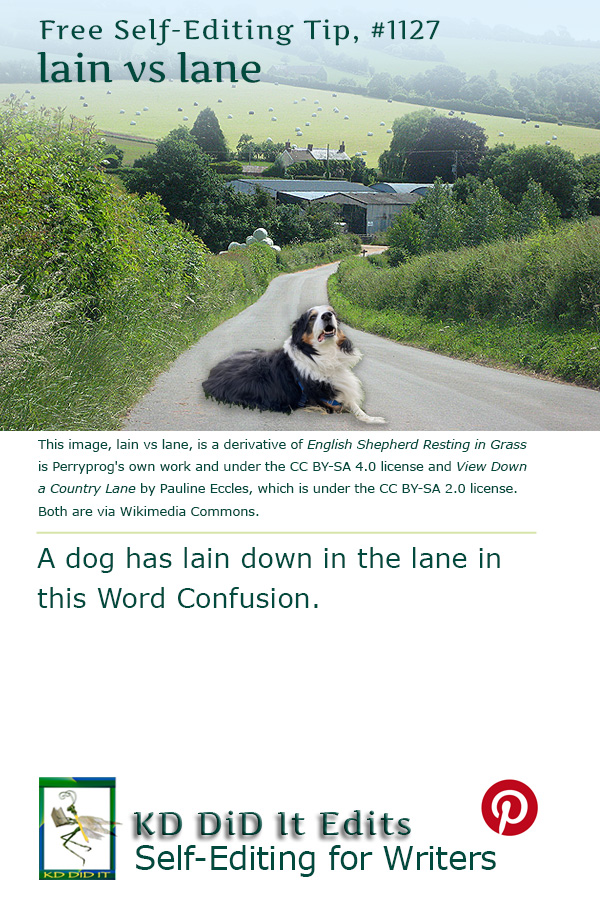Revised as of
1 Dec 2022
This word confusion is an heterograph (a subset of homophone) — lain vs lane, a verb versus a noun.
Lain is a past participle of lie meaning lying in a prostrate position.
Lane is generally first thought of as a narrow country lane. These days, a lane may also be seen as a multiple lane highway.
As lain is strictly the past participle of lie, this post will skip the noun form of lie.
Do have a look at “Lay versus Lie” as well, especially if you’re interested in the noun version of lie and/or “Lade versus Laid“.
Word Confusions . . .
. . . started as my way of dealing with a professional frustration with properly spelled words that were out of context in manuscripts I was editing as well as books I was reviewing. It evolved into a sharing of information with y’all. I’m hoping you’ll share with us words that have been a bête noire for you from either end.
If you found this post on “Lain versus Lane” interesting, consider subscribing to KD Did It, if you’d like to track this post for future updates.
| Lain | Lane |
|---|---|

Seal and Two Penguins by gieljan is in the public domain, via PxHere. — The seal has lain down with penguins for company. |

US 74 Express Lanes by NCDOTcommunications is under the CC BY 2.0 license, via Flickr. |
| Part of Grammar: | |
| Morpheme: lie
Verb Third person present verb: lies |
Noun
Plural: lanes |
| As a verb, it does not require a direct object:
You lie down on the sofa. Requires no movement at all The act of telling an untruth Be in or assume a horizontal position, recline |
A narrow road, especially in a rural area
A division of a road marked off with painted lines and intended to separate single lines of traffic according to speed or direction
|
| Examples: | |
| “In this protected spot where there were no frosts and evidently but little rainfall, the bones might have lain for ages without disintegrating, for there were here no other forces to scatter or disturb them” (Burroughs, chapt 7).
“Then I saw why we had come there; for the two rocks, being both somewhat hollow on the top and sloping one to the other, made a kind of dish or saucer, where as many as three or four men might have lain hidden” (Stevenson, chapt. 20). He had lain face downward in the grass. “Had it lain underneath him all along?” (Jack). “It’s a double bill of the science show that answers all those questions you’ve lain in bed at night worrying about” (Sun). |
She drove along the winding lane.
Her home is over on Park Lane. The car accelerated and moved into the outside lane. She went into the final in lane three. The shipping lanes of the South Atlantic were getting crowded. She’s to shoot from the free throw lane. A maximum of six people can play on a lane at any one time. DNA from various sources is placed in separate lanes on an electrophoretic gel. The innermost dust lane is dense enough to absorb some infrared. |
| Derivatives: | |
| Noun: lie-down, lie-in | Adjective: laned, multi-laned |
| Phrasal Verb | |
| lain about lain ahead lain around lain behind lain in lain off lain to lain with |
|
| History of the Word: | |
| Old English licgan is of Germanic origin and related to the Dutch liggen and the German liegen, from an Indo-European root shared by the Greek lektron, lekhos and the Latin lectus meaning bed. | Old English lane is related to the Dutch laan and is of unknown ultimate origin. |
C’mon, get it out of your system, bitch, whine, moan . . . which words are your pet peeves? Also, please note that I try to be as accurate as I can, but mistakes happen or I miss something. Email me if you find errors, so I can fix them . . . and we’ll all benefit!
Satisfy your curiosity about other Word Confusions on its homepage or more generally explore the index of self-editing posts. You may also want to explore Book Layout & Formatting Ideas, Formatting Tips, Grammar Explanations, Linguistics, Publishing Tips, the Properly Punctuated, Writing Ideas and Resources, and Working Your Website.
Resources for Lain versus Lane
Some of these links may be affiliate links, and I will earn a small percentage, if you should buy it. It does not affect the price you pay.
Apple Dictionary.com
Burroughs, Edgar Rice. Tarzan the Untamed. Wilder Publications, 2015. Originally published in 1920. <https://amzn.to/3O1az3B>. Ebook.
The Free Dictionary: lain
Jack, Ian. “VS Naipaul’s Notorious Conceit has Drained Away – and the Man Who Remains is Hard to Read.” The Guardian. 2015. Web. n.d. <https://www.theguardian.com/commentisfree/2015/jan/31/vs-naipaul-arrogance-used-to-be-legendary-ian-jack>. Article.
Stevenson, Robert Louis. Kidnapped. 2014. Originally published in 1893. <https://amzn.to/3UGmc2w>. Ebook.
The Sun. 2006. Article.
Pinterest Photo Credits:
English Shepherd Resting in Grass is Perryprog‘s own work and under the CC BY-SA 4.0 license and View Down a Country Lane by Pauline Eccles, which is under the CC BY-SA 2.0 license. Both are via Wikimedia Commons.


